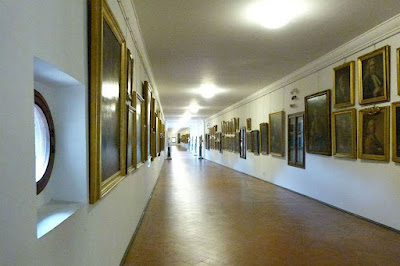The newly renovated Vasari Corridor will open to all in May 2024. As my always intelligent and attentive readers will know, access to the Vasari Corridor, which runs from the Palazzo Vecchio, via the Uffici Galleries and over the Ponte Vecchio, to the Pitti Palace in Florence, has always been problematic. The renovated corridor re-opens 450 years after the death of its creators: the Grand Duke Cosimo I dei Medici, who commissioned the Corridor on the occasion of the wedding of his son Francesco I and who passed away on 21 April 1574, and Giorgio Vasari, who designed and built it and who died on 27 June 1574, just two months after Cosimo I.
Entry to the renovated Vasari Corridor will be available to everyone without the previous need to reserve a place and be accompanied by a guide.
The renovated Vasari Corridor
The ready accessibility of the corridor is very positive but I have to admit to feeling a bit sad about the relocation of the largest, oldest and most important collection of self-portraits in the world, which used to line the walls of the Corridor towards the Pitti Palace end. This collection, which was admirably displayed in the Corridor and directly linked to the creators of the Corridor, has been transferred to the Uffizi Galleries. The self-portraits have been replaced in the Corridor by a series of Roman epigraphs related to the Florence founded by Julius Caesar in 59 BC, and later becoming the capital of the VI Roman Legio that included Tuscany and Umbria. Obviously, these marble plaques are nowhere near as fragile as the paintings, so I suppose this is the price we must pay for free access to the Vasari Corridor.
The Vasari Corridor before renovation.
This, of course, is by no means the first time the Vasari Corridor has been renovated. Up until the late 19 C, there were artisanal workshops built into the arches supporting the Corridor between the Uffizi and the Ponte Vecchio. Those were removed during the 1880's.
View of the Vasari Corridor in the 1880's with workshops still in place.
More about the Vasari Corridor.
|
Author: Anna Maria Baldini









